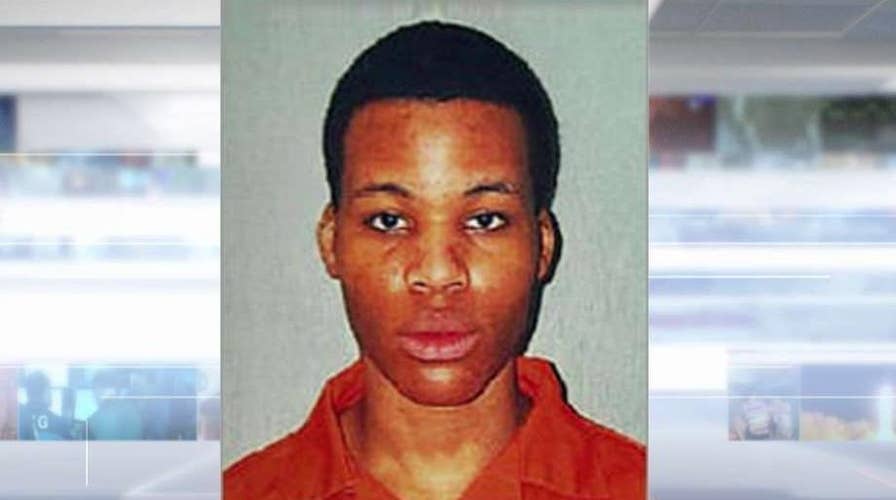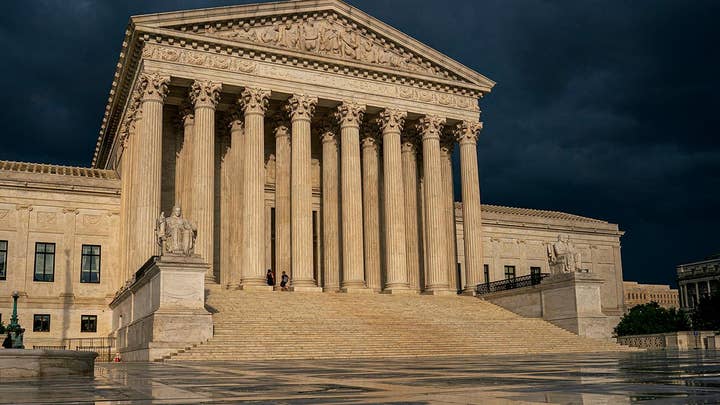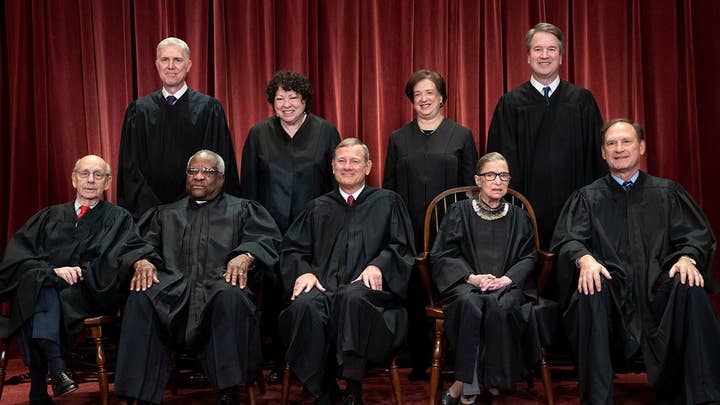Supreme Court to review 'Beltway sniper' appeal
Lee Boyd Malvo, who was 17 years old when he and John Allen Muhammed shot and killed 10 people during a three-week period in Maryland, Virginia and Washington, was sentenced to life without parole; analysis from Fox News senior judicial analyst Judge Andrew Napolitano.
The U.S. Supreme Court seemed split Wednesday on whether to grant Lee Boyd Malvo, one half of the "D.C. sniper" duo who terrorized the nation nearly two decades ago, a new sentencing hearing.
Lawyers for Malvo argued before the highest court to reconsider Malvo's life sentence without the possibility of parole, given the fact that he was a minor when he committed the crimes.
Malvo, alongside mastermind John Allen Muhammad, killed 10 people and injured three others during a three-week rampage in October 2002. The seemingly random shootings gripped the D.C. region and the world.
The pair eventually was arrested near Frederick, Md., and prosecuted in Virginia in 2003. Capital punishment at the time was still an option for juveniles in the state.
DC SNIPER LEE BOYD MALVO'S LIFE SENTENCE THROWN OUT
Muhammad was executed in 2009. Malvo, a Jamaican-born 17-year-old at the time, was given a life sentence without the possibility of parole.
At issue for the Supreme Court: whether Malvo, now 34, should be resentenced in Virginia in light of a pair of recent Supreme Court rulings restricting life-without-parole sentences for crimes committed by juveniles.
Justice Elena Kagan, on the court’s liberal wing, said the high court’s previous rulings on the subject should be understood broadly, and that courts were bound to give serious consideration to the notion that "youth matters" in determining a juvenile’s sentence.
"You have to consider youth in making these sorts of sentencing determinations," said Kagan, referring to a 2012 precedent in a case known as Miller v. Alabama, which directed what trial judges had to consider when sentencing criminal underage offenders. "How much youth matters and how a judge or a jury, whoever the sentencer is, has to take that youth into account. That's the lesson of Miller."
Malvo attorney Danielle Spinelli told the justices, "Virginia is not doing anything to comply with Miller."
On the other side, conservative Justice Samuel Alito suggested the court should simply apply the wording from its earlier case, which banned only mandatory life sentences without parole for juveniles. Because Virginia’s Supreme Court already ruled that Malvo’s trial judge had discretion to lower Malvo's sentence, he would not be entitled to any relief under the court's previous ruling.
He also questioned whether Malvo's alleged "immaturity" because of his age meant he should be considered for possible freedom in the future.
"I thought that was the test that you're saying that the court has to apply, whether it is a child who committed the crimes because of transient immaturity," he asked Spinelli. "So, if he can demonstrate, as a result of good behavior in prison, for example, that he has been rehabilitated, then he must be released?"
The closely watched case could also be an opportunity for the Supreme Court, after the appointments of conservative justices under President Trump, to put the brakes on what has been a gradual move toward more leniency for juvenile offenders.
SUPREME COURT AGREES TO REVIEW CASE OF SURVIVING DC SNIPER
Regardless of the case's outcome, Malvo isn't going to be walking the streets anytime soon. He's serving four life sentences in Virginia and was sentenced to another six life-without-parole terms for shootings in Maryland.
Youth advocates generally have signaled approval with the direction of the Supreme Court on juvenile sentencing in recent years. The court frequently has recognized that minors should be treated differently than adults, citing their lack of maturity and greater ability to change.
In 2005, the court eliminated the death penalty for offenders who were under 18 when they committed crimes. In 2012, the justices said teenage killers couldn't automatically get life sentences with no chance of parole, explaining such a punishment should be rare for minors. Four years later, the court made the decision retroactive, giving additional prisoners hope.
The justices' 2012 and 2016 rulings provided opportunities for inmates such as Malvo to go back to court to challenge their sentences.
Malvo's lawyers argued that he should be resentenced in Virginia because after a jury convicted him of murder but rejected the death penalty, he received a life-without-parole sentence automatically. Virginia has argued that Malvo's sentence wasn't automatic and that a judge could have suspended all or part of it, so Malvo shouldn't be resentenced. Two lower courts have sided with Malvo, ruling that a court should assess whether he's one of the rare juvenile offenders deserving of a life-without-parole sentence.
Malvo's murderous spree in 2002 shook the country to its core.
Nelson Rivera, whose wife, Lori Lewis Rivera, was killed by the D.C. snipers, joined an amicus brief filed by the Maryland Crime Victims Resource Center that said the rulings that could lead to Malvo's resentencing "retraumatize, revictimize and violate the legal and human rights of victims."
Victor Stone, an attorney for the center told The Washington Post, "people like Mr. Rivera lost a really important family member." He added that new hearings and hope of a resentence put "a tremendous burden and revictimization on victims' families who struggle with that loss."
CLICK HERE FOR THE FOX NEWS APP
The Fairfax County, Va., prosecutor who helped convict Malvo told WTOP he "hopes and prays" Malvo's life sentences would remain as they are.
"I've heard a number of people say this isn't about releasing Malvo, but that's not true. It's all about releasing Malvo," said Ray Morrogh, who was co-counsel when Malvo was convicted for the capital murder of FBI analyst Linda Franklin.
The Associated Press contributed to this report.







